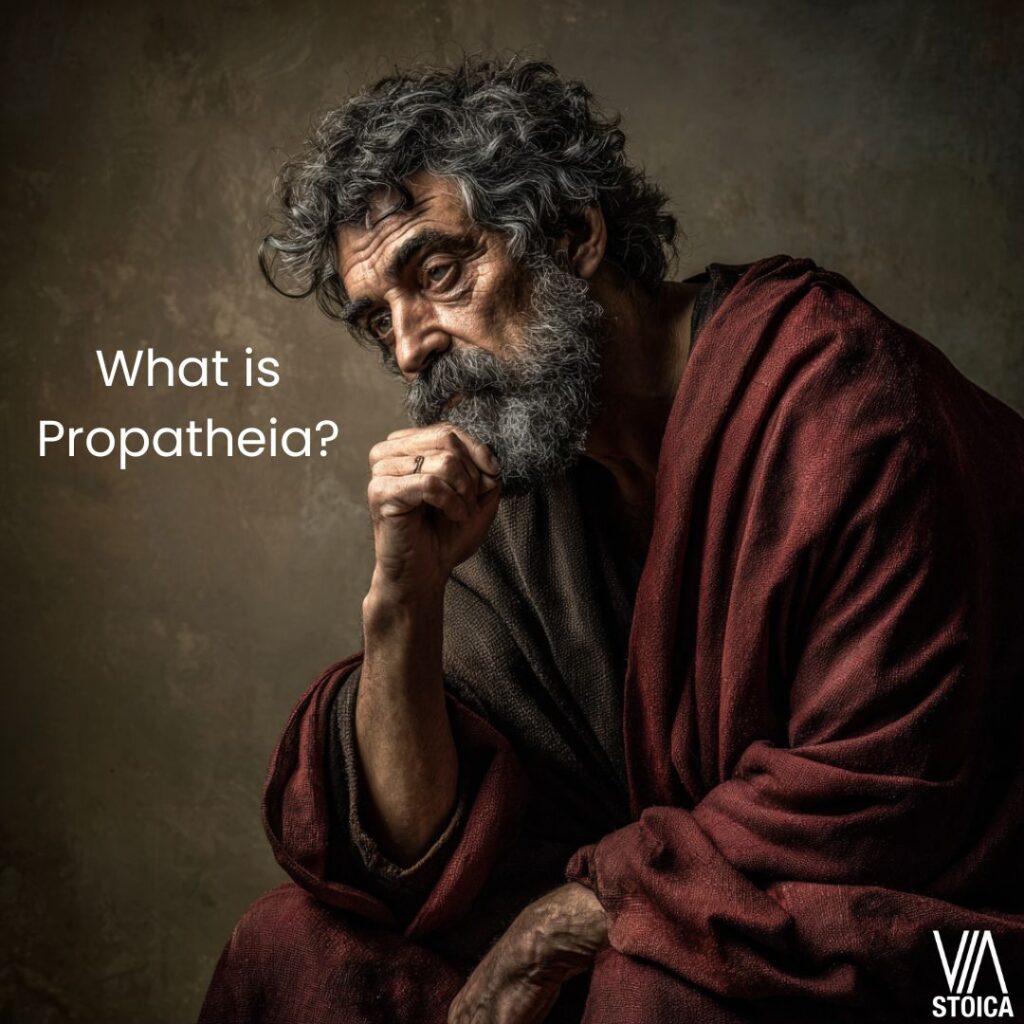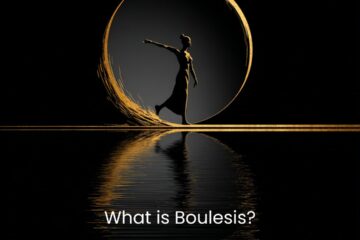What is Propatheia?

Propatheia is an involuntary emotional reaction to an impression, shaped by your character and pre-existing beliefs, but occurring before reason has the chance to evaluate or judge what is truly happening.
Have you ever flinched at sudden news or felt your heart skip before you caught yourself? That moment, before reason kicks in, is exactly what the Stoics called propatheia (προπάθεια). It’s a vital concept in Stoic psychology and emotional training, one that’s useful for navigating daily life.
Understanding what propatheia is, and what it is not, can help you better manage your reactions, develop self-mastery, and live with greater inner calm.
What Does Propatheia Mean?
Propatheia refers to the initial, involuntary emotional reaction to an impression, before reason has judged it. The Stoics did not see this reaction as a failure of character or as blameworthy. Instead, they understood it as natural and unavoidable.
What matters is not the instinctive shiver of fear or the flush of anger, but whether we give assent to it, whether we let it grow into full-blown emotion (πάθος).
Breaking Down the Word
- Greek: προπάθεια (propathēia)
- Prefix: pro- (before)
- Root: pathos (emotion or suffering)
So, propathēia literally means “pre-emotion” or “preliminary emotional reaction.”
In Stoic thought, this distinction matters because it helps us separate what is automatic from what is within our control. The wise person does not try to eliminate all feelings, but learns not to assent to misleading ones.
Dimensions of Propatheia
- Involuntary by Nature
It arises spontaneously and is not yet a moral failure. - Test of Inner Discipline
It offers a moment of choice; will you assent, or pause? - Emotion vs. Judgment
Propatheia is raw sensation. Emotion only forms when you agree with it.
How Propatheia Connects to Core Stoic Ideas
- Virtue (ἀρετή): Virtue lies in how we respond to impressions, not in avoiding the impressions themselves.
- Reason (λόγος): Reason acts as the gatekeeper. It decides whether an initial impulse becomes a ruling judgment.
- Assent (συγκατάθεσις)
Assent is the critical turning point. When we give assent to a propatheia, it becomes a full-blown emotion (pathos). Stoic training is about pausing before this moment. - Emotion (πάθος)
A pathos is not just feeling; it’s the result of mistaken judgment. It’s when we say, “This is terrible!” rather than simply noticing fear. The sage may feel, but does not suffer.
Common Misunderstandings
Propatheia ≠ Emotion
People often assume Stoics aim to be emotionless. But propatheia shows that even a wise person may feel a flash of fear or grief.
Propatheia ≠ Repression
Stoicism is not about pushing feelings down. It’s about observing without surrendering.
Why Propatheia Matters in Stoic Training
This concept is central to emotional resilience. Epictetus taught that we cannot control external events or our initial reaction to them, but we can control our assent. Marcus Aurelius also reflected on the importance of pausing before emotion takes over.
Recognizing propatheia in yourself creates space, space for wisdom to act, rather than instinct.
How to Practice Propatheia Awareness
- Journaling Prompt
“When did I feel something today before I understood it? Did I assent, or pause?” - Daily Mindset Check
When an intense feeling arises, silently say: “This is a pre-emotion. I choose how to respond.” - Situational Exercise
The next time someone interrupts or criticizes you, notice your first feeling. Breathe. Don’t react. Wait for reason. - Study the Concept
Read Epictetus, Discourses Book 3, Chapter 3, Seneca’s Letter 11 on emotional training, and Stoicism and Emotion by Margaret Graver.
FAQ Section
What does propatheia mean in Stoicism?
It means a pre-emotion, an automatic, involuntary reaction that precedes judgment or full emotion.
Is propatheia the same as emotion?
No. Emotion involves assent and judgment. Propatheia is what happens before that decision.
Can anyone learn to manage propatheia?
Yes. Through self-awareness and daily practice, you can learn to pause and regain control over how you respond to the pre-emotion.
🔗 Want to explore more Stoic strategies?
Book a free consultation with one of our Stoic Coaches or learn about more Stoic philosophy terms. You can also listen to the Via Stoica podcast on Spotify or Apple Podcasts or watch it on YouTube.



0 Comments